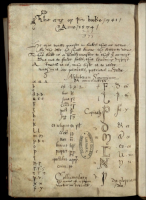Michael Twomey (English) lectures and serves on Ph.D. jury in Belgium
10/23/16
Contributed by Dan Breen
 During the week of October 10th, Michael Twomey (English; Dana Professor of Humanities and Arts) visited Belgium at the invitation of the Centre d’Études sur le Moyen Âge et la Renaissance (Center for Medieval and Renaissance Studies) at the Université Catholique de Louvain, Belgium, where he delivered a lecture and served on a dissertation jury.
During the week of October 10th, Michael Twomey (English; Dana Professor of Humanities and Arts) visited Belgium at the invitation of the Centre d’Études sur le Moyen Âge et la Renaissance (Center for Medieval and Renaissance Studies) at the Université Catholique de Louvain, Belgium, where he delivered a lecture and served on a dissertation jury.
Michael’s lecture, “Looking for Evidence in the Margins of Manuscripts: What Marginal Annotations Can and Can’t Tell Us About the Reception of Medieval Encyclopedias,” presented a taxonomy of annotations written by medieval and early modern readers of medieval encyclopedias about the natural world. Although these annotations are important indicators of readers’ responses to texts, Michael is the first to research them. In the course of this project, he has studied more than 60 medieval manuscripts over a period of ten years. The photograph accompanying this announcement shows a folio from one of the manuscripts in Michael’s lecture: a tenth century manuscript with notes by Stephen Bateman, private secretary to the 16th century collector Matthew Parker, who was also archbishop of Canterbury during the reign of England’s Queen Elizabeth I. In the notes on this folio, Bateman praises the book, Isidore of Seville’s Etymologies (completed in 636 CE), as a “schoolmaster for those that are wise.”
Michael’s lecture was one of a series of events in UCL’s special program for AY 2016-17, titled “Le Moyen Âge en Morceaux” (The Middle Ages in Pieces).
The dissertation that Michael adjudicated concerned the use of Arabic science and Arabic translations of ancient Greek science in medieval encyclopedias. Serving on the dissertation jury involved questioning the candidate privately in a two-hour morning session, then delivering a lengthy assessment of the dissertation in a two-hour public session in the afternoon on the same day. At the highly ceremonious public session, the examiners wore UCL academic gowns; but after the proclamation awarding the Ph.D. to the candidate, there was an informal reception, after which the candidate’s family treated the dissertation jury, family, and friends to a banquet.
With Michael on the five-person dissertation jury were the Ph.D. candidate’s doctoral committee and an evaluator from the Institut de Recherche d’Histoire des Textes (Institute for Research into the History of Texts) in Paris. The president of UCL, who is also a member of the French faculty, oversaw the proceedings.
The Université Catholique de Louvain is Belgium’s major French-speaking university; but to his great relief, Michael was permitted to deliver his lecture and his assessment of the candidate’s dissertation in English.
Source of image at right: Cambridge, Trinity College MS. B.15.33, Isidore, Etymologiae, V.xxxiii.1-IX.vii.28 (s. x, England), fol. 145v. The manuscript is available online at http://trin-sites-pub/trin.cam.ac.uk/james/viewpage.php?index=234
0 Comments
https://www.ithaca.edu/intercom/article.php/20161023213650276
 During the week of October 10th, Michael Twomey (English; Dana Professor of Humanities and Arts) visited Belgium at the invitation of the Centre d’Études sur le Moyen Âge et la Renaissance (Center for Medieval and Renaissance Studies) at the Université Catholique de Louvain, Belgium, where he delivered a lecture and served on a dissertation jury.
During the week of October 10th, Michael Twomey (English; Dana Professor of Humanities and Arts) visited Belgium at the invitation of the Centre d’Études sur le Moyen Âge et la Renaissance (Center for Medieval and Renaissance Studies) at the Université Catholique de Louvain, Belgium, where he delivered a lecture and served on a dissertation jury.